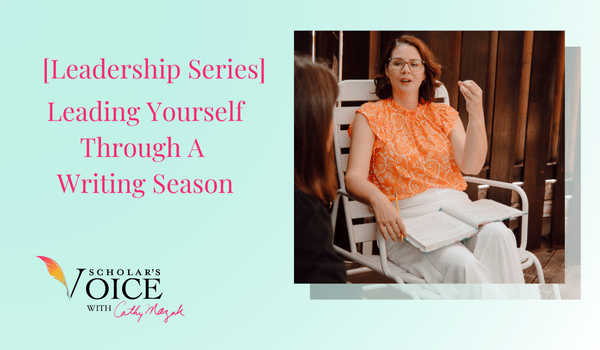“But If I Don’t Do It, Who Will?” With Guest Natalie Miller

Meet my coach, Natalie Miller! Natalie is a professional coach who helps people with exceptionally high standards navigate life. Like myself, most of Natalie’s clients are also coaches.
MORE DETAILS
In today’s episode, we discuss the consequences of hyper-responsibility. We explore how high standards can push us into overwork and why institutions support a “do it myself” work ethic. We talk about this issue from multiple angles and through the lens of academia and life at home. You can be a successful academic and set boundaries on your time, wants, and desires. It may require systemic change in the framework of your institution, but even more importantly, it requires personal and professional development.
Tune in to hear our thoughts on hyper-responsibility and how to leverage high standards in a way that does not result in burnout or overwork.
If I Don’t Do It, Who Will?
So many academic women struggle with a mindset of “If I don’t do it, who will?” Usually, this question masks the fear that if you don’t do it yourself, the task won’t be completed to your standards. So, instead of delegating work equitably, you become overwhelmed and overworked. It is impossible and unstainable to think that you can do it all. While this strategy might have worked for group projects in high school, it will not serve you professionally.
But from an academic perspective, many institutions have a framework that forces a ton of tasks on one person. In this scenario, if it doesn’t get done, it genuinely won’t get done. The only solution is not to be hyper-responsible. When the ‘ask’ is too big, turn it back on the institution to start to enact change.
Costs of Hyper Responsibility
Regardless of which lens you look at hyper responsibility through – at home or work – there are very real costs to this behavior. By taking on every task solo, you are compromising education and inhibiting a better process of being created that is more equitable and self-sufficient.
Academics are usually hesitant to say no because the burden of work will just be passed to someone else. Instead, we need to develop a new system that is more collaborative and evolves the culture of academia away from overwork.
What Do You Want & What Do You Need
It is so difficult to say what you want or need. This is a systemic issue that affects women disproportionately. We have an ambivalent relationship with desire because societal norms train us to want things that benefit men. In addition, everything is constantly changing and evolving, so our desires change with them.
You are allowed to need things! It is challenging for a group leader to ask for help. For many people who are hyper-responsible, that mindset started in childhood. You were self-sufficient and autonomous. Shifting to a place where you receive instead of giving can be a challenge because it is something that you have to learn how to do. However, allowing yourself to need things and express those needs is vital to growth.
“A good question to ask yourself is: ‘What does my hyper responsibility cost me and what does it cost the system that I am working in?’ The institution is probably saving money, but there is a cost to the institution by trying to force an unrealistic responsibility onto staff.”
“The institution or the culture of academia says you alone are responsible for your publications and scholarly production and if you don’t hit the bar, it’s on you. But the institution is also creating conditions which overburden you. So being able to make choices that help preserve your time also makes publishing harder and harder because they’re creating an unsustainable work environment.”
We’ve opened the waitlist for our next cohort of Navigate: Your Writing Roadmap®. Check out the program details and get on the waitlist here.
CONTINUE THE CONVERSATION:
- Our 12-week Navigate: Your Writing Roadmap® program helps tenure-track womxn and nonbinary professors to publish their backlog of papers so that their voice can have the impact they know is possible. Get on the waitlist here!
- Cathy’s book, Making Time to Write: How to Resist the Patriarchy and Take Control of Your Academic Career Through Writing is available in print! Learn how to build your career around your writing practice while shattering the myths of writing every day, accountability, and motivation, doing mindset work that’s going to reshape your writing, and changing academic culture one womxn and nonbinary professor at a time. Get your print copy today or order it for a friend here!
- Want to train with us for free on your campus? Now you can when you recommend our Scholar’s Voice Faculty Retreats to a decision-maker on your campus! Download the brochure with the retreat curriculum and both in-person and online retreat options here.
FOLLOW US ON SOCIAL:
RELATED PODCASTS
Stay current in Academic Publishing
Subscribe to our newsletter:
In the Pipeline
writing tips, publishing trends, reading recomendations, free workshops





